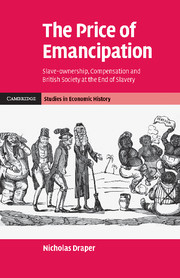Description
The Price of Emancipation
Slave-Ownership, Compensation and British Society at the End of Slavery
Cambridge Studies in Economic History - Second Series
Author: Draper Nicholas
This book is a comprehensive analysis of the extent and importance of absentee slave-ownership and its impact on British society.
Language: English
Subject for The Price of Emancipation:
Approximative price 38.06 €
In Print (Delivery period: 14 days).
Add to cart
The Price of Emancipation
Publication date: 07-2013
Support: Print on demand
Publication date: 07-2013
Support: Print on demand
Approximative price 100.60 €
Subject to availability at the publisher.
Add to cart
The price of emancipation: slave-ownership, compensation and british society at the end of slavery, 1823â1838
Publication date: 12-2009
416 p. · 16x23.5 cm · Hardback
Publication date: 12-2009
416 p. · 16x23.5 cm · Hardback
Description
/li>Contents
/li>Biography
/li>
When colonial slavery was abolished in 1833 the British government paid £20 million to slave-owners as compensation: the enslaved received nothing. Drawing on the records of the Commissioners of Slave Compensation, which represent a complete census of slave-ownership, this book provides a comprehensive analysis of the extent and importance of absentee slave-ownership and its impact on British society. Moving away from the historiographical tradition of isolated case studies, it reveals the extent of slave-ownership among metropolitan elites, and identifies concentrations of both rentier and mercantile slave-holders, tracing their influence in local and national politics, in business and in institutions such as the Church. In analysing this permeation of British society by slave-owners and their success in securing compensation from the state, the book challenges conventional narratives of abolitionist Britain and provides a fresh perspective of British society and politics on the eve of the Victorian era.
Introduction; 1. The absentee slave-owner: representations and identities; 2. The debate over compensation; 3. The distribution of slave compensation; 4. The structure of slave ownership; 5. The large-scale rentier owners; 6. 'Widows and orphans': small-scale British slave-owners; 7. Merchants, bankers and agents in the compensation process; 8. Conclusion; Appendix.
Nicholas Draper is Research Associate at the Department of History, University College London.
© 2024 LAVOISIER S.A.S.




